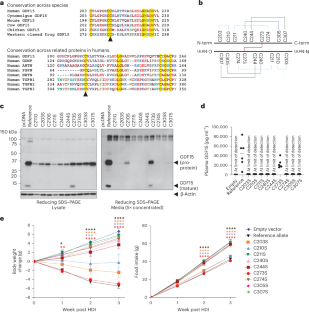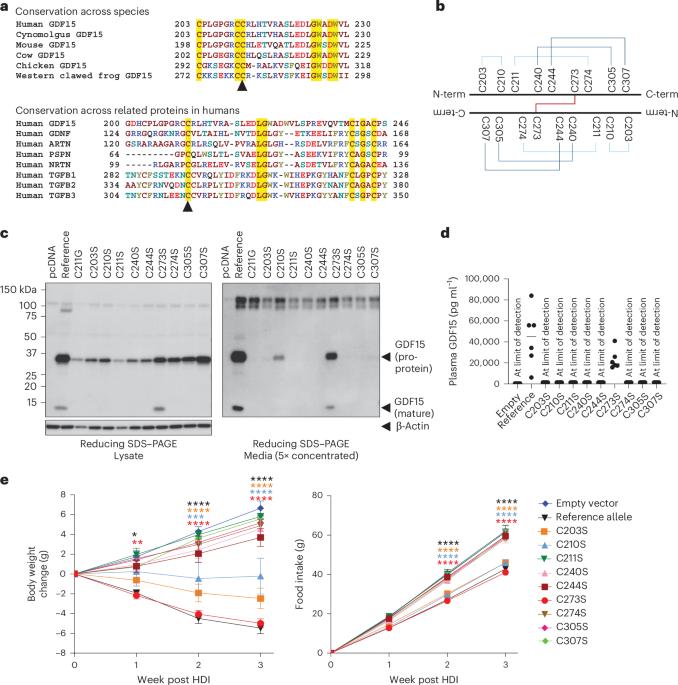Identification and characterization of human GDF15 knockouts
IF 20.8
1区 医学
Q1 ENDOCRINOLOGY & METABOLISM
引用次数: 0
Abstract
Growth differentiation factor 15 (GDF15) is a secreted protein that regulates food intake, body weight and stress responses in pre-clinical models1. The physiological function of GDF15 in humans remains unclear. Pharmacologically, GDF15 agonism in humans causes nausea without accompanying weight loss2, and GDF15 antagonism is being tested in clinical trials to treat cachexia and anorexia. Human genetics point to a role for GDF15 in hyperemesis gravidarum, but the safety or impact of complete GDF15 loss, particularly during pregnancy, is unknown3–7. Here we show the absence of an overt phenotype in human GDF15 loss-of-function carriers, including stop gains, frameshifts and the fully inactivating missense variant C211G3. These individuals were identified from 75,018 whole-exome/genome-sequenced participants in the Pakistan Genomic Resource8,9 and recall-by-genotype studies with family-based recruitment of variant carrier probands. We describe 8 homozygous (‘knockouts’) and 227 heterozygous carriers of loss-of-function alleles, including C211G. GDF15 knockouts range in age from 31 to 75 years, are fertile, have multiple children and show no consistent overt phenotypes, including metabolic dysfunction. Our data support the hypothesis that GDF15 is not required for fertility, healthy pregnancy, foetal development or survival into adulthood. These observations support the safety of therapeutics that block GDF15. This study reports and characterizes the impact of loss-of-function GDF15 variants in human individuals.


人类 GDF15 基因敲除基因的鉴定和特征描述
生长分化因子 15(GDF15)是一种分泌蛋白,在临床前模型中可调节食物摄入量、体重和应激反应1。GDF15 在人体中的生理功能尚不清楚。在药理学上,GDF15 在人体内激动会引起恶心,但不会伴随体重减轻2,GDF15 拮抗剂正在临床试验中用于治疗恶病质和厌食症。人类遗传学表明GDF15在妊娠剧吐中的作用,但GDF15完全丧失(尤其是在怀孕期间)的安全性或影响尚不清楚3,4,5,6,7。在这里,我们展示了人类 GDF15 功能缺失携带者没有明显的表型,包括停止增益、框架移位和完全失活的错义变体 C211G3。这些个体是从巴基斯坦基因组资源(Pakistan Genomic Resource)8,9 的 75,018 名全外显子组/基因组测序参与者以及基于家庭招募的变异携带者原型召回研究中发现的。我们描述了包括 C211G 在内的 8 个同源基因("基因敲除")和 227 个异源基因的功能缺失等位基因携带者。GDF15 基因敲除者的年龄从 31 岁到 75 岁不等,具有生育能力,有多个子女,没有表现出一致的明显表型,包括代谢功能障碍。我们的数据支持这样的假设,即 GDF15 并非生育、健康怀孕、胎儿发育或存活至成年所必需。这些观察结果支持了阻断 GDF15 的疗法的安全性。
本文章由计算机程序翻译,如有差异,请以英文原文为准。
求助全文
约1分钟内获得全文
求助全文
来源期刊

Nature metabolism
ENDOCRINOLOGY & METABOLISM-
CiteScore
27.50
自引率
2.40%
发文量
170
期刊介绍:
Nature Metabolism is a peer-reviewed scientific journal that covers a broad range of topics in metabolism research. It aims to advance the understanding of metabolic and homeostatic processes at a cellular and physiological level. The journal publishes research from various fields, including fundamental cell biology, basic biomedical and translational research, and integrative physiology. It focuses on how cellular metabolism affects cellular function, the physiology and homeostasis of organs and tissues, and the regulation of organismal energy homeostasis. It also investigates the molecular pathophysiology of metabolic diseases such as diabetes and obesity, as well as their treatment. Nature Metabolism follows the standards of other Nature-branded journals, with a dedicated team of professional editors, rigorous peer-review process, high standards of copy-editing and production, swift publication, and editorial independence. The journal has a high impact factor, has a certain influence in the international area, and is deeply concerned and cited by the majority of scholars.
 求助内容:
求助内容: 应助结果提醒方式:
应助结果提醒方式:


